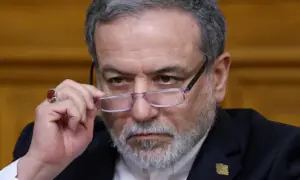Modi majority set to shrink as Indian election results emerge
4 min readIndian Prime Minister Narendra Modi’s alliance was headed for a narrow majority as vote-counting in the general election neared completion on Tuesday, with its tally well short of an expected landslide in a surprise setback for the populist leader.
Modi’s own Bharatiya Janata Party (BJP) was falling short of a majority of its own in the 543-member parliament, the trends showed. Having to depend on allies to form the government could introduce some uncertainty into policymaking after a decade in which Modi has ruled with an authoritative hold.
The Hindu nationalist BJP won a majority on its own when it won power in 2014, ending India’s era of unstable coalition governments, and repeated the feat in 2019.
The prospect of Modi having to rely on allies spooked markets, with stocks falling steeply. The blue-chip NIFTY 50 sank 5.9% and the S&P BSE Sensex tumbled 5.7%, posting their steepest decline on an election outcome day since 2004, when a BJP-led coalition lost power.
The rupee also fell sharply against the dollar and benchmark bond yields were up.
Markets had soared on Monday after exit polls on June 1 projected Modi and BJP would register a big victory, and the ruling National Democratic Alliance (NDA) was seen getting a two-thirds majority and more.
At 1300 GMT, TV channels showed the NDA was ahead in nearly 300 of the 543 elective seats in the lower house of parliament, where 272 is an overall majority, with counting nearing its end.
Full results are likely later on Tuesday evening.
They showed BJP accounted for around 240 of the seats in which the NDA was leading, compared with the 303 it won in 2019.
Indian elections

Official results
Bharatiya Janata Party: 209 seats
Indian National Congress: 80 seats
The rest were won by smaller parties. We will update as new figures come in:

Poor sharing
“The NDA will form the government for the third time. PM Modi will be sworn-in for the third time. Congress will sit in opposition for the third time,” BJP spokesperson Jaiveer Shergill said, referring to the main opposition Congress party.
“Introspection about the slide and the decrease in the seats will be done threadbare. We will put our ear to the ground,” he said.
Two key regional allies in the NDA endorsed Modi as the next prime minister, rejecting local media speculation that they could be wavering in their support or possibly switch sides.
The Telugu Desam Party (TDP) and Janata Dal (United) said their pre-poll alliance with BJP was intact and they would form the next government.
The BJP’s numbers were likely pulled down by the party’s poor showing in the country’s most populous state, Uttar Pradesh, which also sends 80 lawmakers to parliament.
The party was leading in 33 seats in the state, down from the 62 it won there in 2019, with analysts saying bread-and-butter issues had overshadowed the BJP’s appeal to the Hindu majority.
A grand temple to Hindu god-king Lord Ram that Modi inaugurated in January had not boosted the BJP’s fortunes as it was expected to, they said.
The opposition INDIA alliance led by Rahul Gandhi’s centrist Congress party, was leading in over 230 seats, higher than expected. Congress alone was leading in nearly 100 seats, almost double the 52 it won in 2019 - a surprise jump that is expected to boost Gandhi’s standing.
“The country has unanimously and clearly stated, we do not want Narendra Modi and Amit Shah to be involved in the running of this country, we do not like the way they have run this country,” Gandhi told reporters, referring to Modi’s powerful number two, Home Minister Shah. “That is a huge message.”
Gandhi said Congress would hold talks with its allies on Wednesday and decide on the future course of action, when asked if the opposition would try to form a government.
Markets in panic
If Modi’s victory is confirmed even by a slim margin, his BJP and its allies will have triumphed in a vitriolic campaign in which parties accused each other of religious bias and of posing a threat to sections of the population.
Investors had cheered the prospects of another Modi term, expecting it to deliver further years of strong economic growth and pro-business reforms, but the margin of victory emerged as a worry during the counting.
“The key question is whether BJP can retain single party majority. If not, then would its coalition be able to deliver economic development, particularly infrastructure?” said Ken Peng, head of investment strategy, Asia, at Citi Global Wealth in Singapore.
“There may be more expansionary fiscal policy to strengthen welfare and other local government spending,” he said.
Neelesh Surana, chief investment officer, at Mirae Asset Mutual Fund, said the market reaction was an over-reaction that reflected a sense of disbelief. “However, despite the verdict, there will likely be underlying continuity in government policies,” he said.
Modi, 73, who first swept to power in 2014 by promising growth and change, is seeking to be only the second prime minister after India’s independence leader Jawaharlal Nehru to win three straight terms.
For the latest news, follow us on Twitter @Aaj_Urdu. We are also on Facebook, Instagram and YouTube.

























Comments are closed on this story.